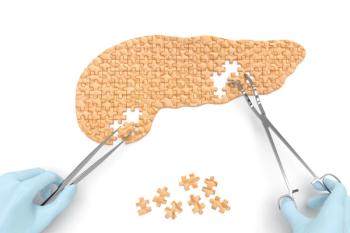The FDA has approved amivantamab-vmjw (Rybrevant) plus carboplatin and pemextred as a first-line treatment of locally advanced or metastatic non-small cell lung cancer (NSCLC) with epidermal growth factor receptor (EGFR) exon 20 insertion mutations detected by an FDA-approved test.1
Traditional approval was also granted to amivantamab-vmjw for adults with locally advanced or metastatic NSCLC with EGFR exon 20 insertion mutations whose disease has progressed either on or after platinum-based chemotherapy. The approval follows a decision by the agency to grant accelerated approval to the drug, a bispecific antibody directed against EGF and MET receptors, in May 2021.2
"When aiming for the best possible treatment outcomes, a targeted approach should be used in the first line for patients with EGFR exon 20 insertion mutations, as this is a commonly applied practice for patients with NSCLC harboring other molecular driver alterations," said Joshua K. Sabari, MD, an oncologist a NYU Langone's Perlmutter Cancer Center and study investigator, in a press release.3 "The results observed in the PAPILLON study showed significant improvement in progression-free survival, supporting the use of this regimen as the potential standard of care in the first-line treatment of these patients."
"This new regimen is a major advance over chemotherapy alone," added Marcia Horn, executive director of the Exon 20 Group and CEO of the International Cancer Advocacy Network (ICAN). "We've seen firsthand the extended survival that Exon 20 Group patients experienced...and we're delighted that this historic treatment option, which specifically targets EGFR exon 20 insertion mutation, has been approved."
The FDA evaluated data from the randomized, open-label, multicenter, phase 3 PAPILLON clinical trial (NCT04538664) to determine treatment efficacy. The trial included 308 patients with EGFR exon 20 insertion mutations who were randomly assigned 1:1 to receive either amivantamab-vmjw plus carboplatin and pemetrexed or carboplatin plus pemetrexed alone.
The primary efficacy outcome for the study was progression-free survival evaluated via blinded independent central review; overall survival was evaluated as a key secondary outcome.
READ MORE: Wildfire Smoke Associated With Worse NSCLC Survival Rates After Surgical Resection
About PAPILLON
Trial Name: A Study of Combination Amivantamab and Carboplatin-Pemetrexed Therapy, Compared With Carboplatin-Pemetrexed, in Participants With Advanced or Metastatic Non-Small Cell Lung Cancer Characterized by Epidermal Growth Factor Receptor (EGFR) Exon 20 Insertions
ClinicalTrials.gov Identifier: NCT04538664
Sponsor: Janssen Research & Development
Summary: To compare efficacy in study participants treated with amivantamab plus chemotherapy vs chemotherapy alone in locally advanced or metastatic non-small cell lung cancer (NSCLC) characterized by EGFR exon 20 insertion mutations.
Data from PAPILLION were published in the New England Journal of Medicine4 in November 2023. Results showed that progression-free survival was significantly longer in the amivantamab plus carboplatin and pemextred group (n=153) compared with the carboplatin plus pemextred alone group (n=155); median progression-free survival was 11.4 months and 6.7 months in each group, respectively (HR, 0.40; 95% CI, 0.30-0.53). At 18 months, progression-free survival was 31% and 3% in the amivantamab plus carboplatin and pemetrexed and the carboplatin plus pemetrexed groups, respectively; complete or partial response at the time of data cutoff was reported in 73% and 47% of patients, respectively (rate ratio, 1.50; 95% CI, 1.32-1.68).
Results of an interim overall survival analysis indicated a hazard ratio for death of 0.67 for the amivantamab group vs the carboplatin plus pemextred group (95% CI, 0.42-1.09).
The benefit to progression-free survival was also observed across analyses of all prespecified subgroups, which included race, age, sex, smoking history, Eastern Cooperative Oncology Group (ECOG) performance-status score, and history of brain metastases.
The most common adverse reactions to treatment included rash, nail toxicity, stomatitis, infusion-related reactions, fatigue, edema, constipation, decreased appetite, nausea, COVID-19, diarrhea, and vomiting.
READ MORE: Oncology Resource Center
References
4. Zhou C, Tang K-J, Cho BC, et al; for the PAPILLON Investigators. Amivantamab plus chemotherapy in NSCLC with EGFR exon 20 insertions. N Engl J Med. 2023;389:2039-2051. doi:10.1056/NEJMoa2306441
























